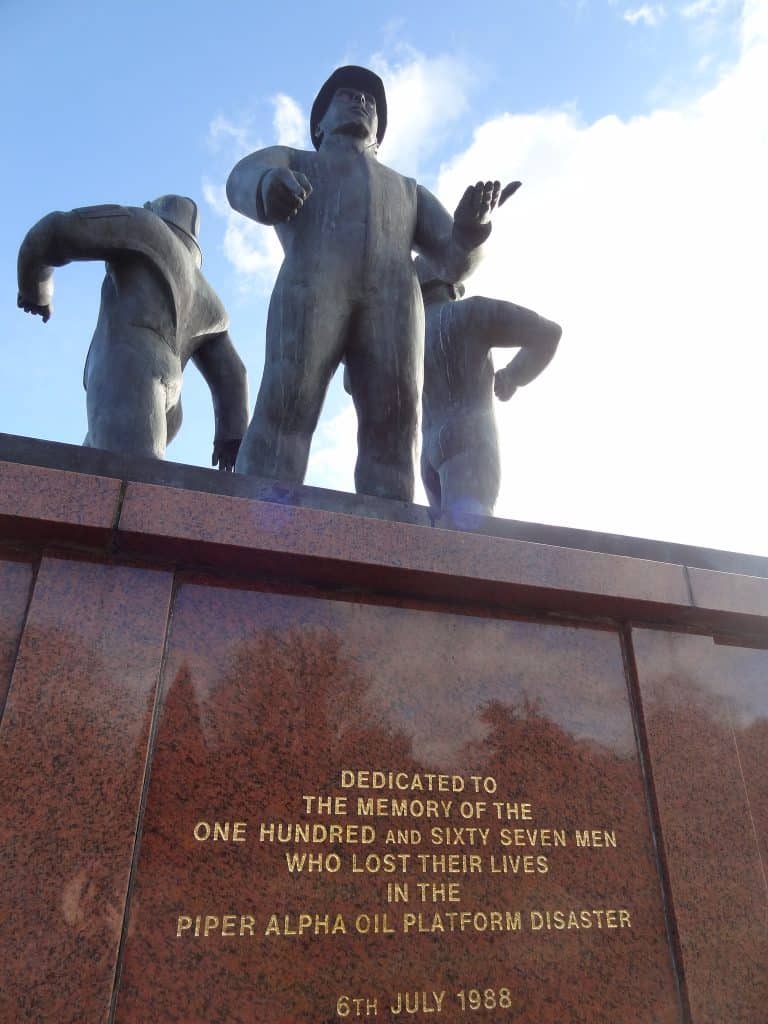Remembering an Accident: Piper Alpha Oil Platform

The memorial in Aberdeen, Scotland, honors 167 lives lost in the Piper Alpha oil platform disaster in the British North Sea on July 6, 1988.
In 1988, explosions on the Piper Alpha oil platform in the British North Sea killed 167 people. This became the deadliest offshore oil rig accident in history.
After explorers discovered crude reserves in 1973, a joint venture started operations on the UK Continental Shelf in 1976. US-based Occidental managed Piper Alpha, located 120 miles north-east of Aberdeen. One of the UK’s largest offshore oil platforms, Piper Alpha produced more than 300,000 barrels of crude oil per day at its peak. At the time, this represented approximately 10% of the country’s total crude oil production.
In the early 1980s, the offshore platform started producing gas, with three main gas transport risers and an oil export riser.
The Piper Alpha disaster began on July 6, 1988, following a gas leak from one of the platform’s condensate pipes.
Engineers had removed the pressure safety valve of the corresponding condensate-injection pump as part of routine maintenance earlier in the day. During the work, the open condensate pipe was temporarily sealed with two large metal caps, known as blind flanges.
When the maintenance crew’s shift ended, the work remained incomplete and the temporary covers remained in place. The engineers used work permits to notify the evening crew that the condensate-injection pump they had worked on should not be switched on under any circumstances.
Somehow, this message was lost on the crew of the Piper Alpha
The night crew turned on the dangerous pump after another pump failed, resulting in the leakage of gas condensate from the two blind flanges. The gas then ignited, and while automatic fire control measures would usually dampen the flames, crews had disabled these during maintenance.
Explosions on the platform began just after 10 pm. An emergency stop quickly halted all extraction, but the initial explosion devastated the platform’s control room. Piper Alpha’s oil extraction design could not withstand gas explosions, leaving crew vulnerable and preventing them from attempting to control the fire.
A mayday call from the Piper Alpha soon followed
At this time, there were 226 workers on the platform, though only 61 would survive the disaster. Two rescuers also died in their attempt to help, and bringing the fire under control took three weeks.
A public enquiry made 106 recommendations to help prevent future incidents, including greater clarity over work permits, more robust fire suppression systems, and forming a single regulator for offshore safety. According to the report, the company had inadequate safety measures in place at the time, though Occidental never faced criminal charges.
Source: Offshore Technology, “The World’s Worst Offshore Oil Rig Disasters.”
Circumstances can crop up anywhere at any time if proper and safe sequence and procedures are not planned and followed. We encourage you to learn and use the TapRooT® System to find and fix problems.
TapRooT® has a team of investigators and instructors with years of extensive training ready to offer assistance worldwide. We also offer ongoing support to our clients through free newsletters and root cause tip videos, the root cause analysis blog, and our annual Global TapRooT® Summit.
Register for one of our TapRooT® courses. We offer a basic 2-day course and an advanced 5-day course. Contact us or call 865.539.2139 about having a course at your site or for further root cause analysis opportunities. We’re here to find solutions for you.
Contact us to discuss training your employees on-site. You may also call us at 865.539.2139 to speak to an instructor, schedule an executive briefing, or book on-site training for your team.



